You have no items in your cart.
Saturday Morning Coffee
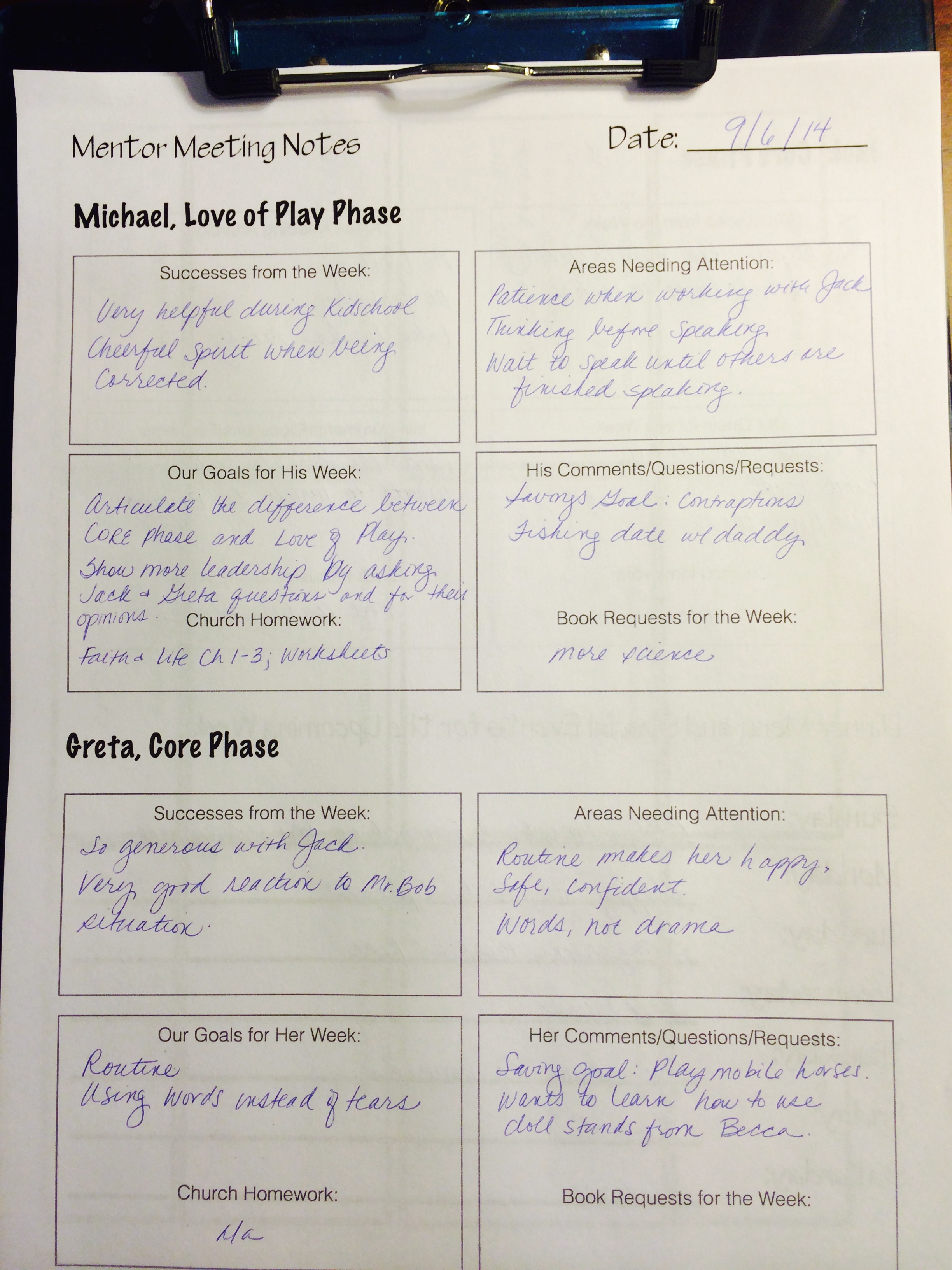
 I love my husband. I love him for lots of reasons but chief among them is because his trust in me and my vocation means that I get this amazing opportunity to raise these children alongside him in a way that feels incredibly natural and meaningful. But I have a secret: it is easier for both of us to trust that process when we have a plan and one that is nurtured and cultivated with care and regular attention. Thanks to Leadership Education: The Phases of Learning, I saw the need for weekly planning meetings clearly outlined and strongly encouraged.
I love my husband. I love him for lots of reasons but chief among them is because his trust in me and my vocation means that I get this amazing opportunity to raise these children alongside him in a way that feels incredibly natural and meaningful. But I have a secret: it is easier for both of us to trust that process when we have a plan and one that is nurtured and cultivated with care and regular attention. Thanks to Leadership Education: The Phases of Learning, I saw the need for weekly planning meetings clearly outlined and strongly encouraged.
“Sunday is the day that makes it all work. Each Sunday we hold our Family Executive Committee (FEC) meeting. The family members who attend this meeting are Mom and Dad. Both are full voting partners, and we consider our unanimity in prayerful decisions to constitute a vote from God.” (Page 72).
While my husband and I do it on Saturdays and call it “Saturday Morning Coffee,” the aim is the same.
Throughout the TJEd circles, we hear about “Couples Meetings”. In fact, Nicholeen Peck in A House United also advocates for the weekly meeting. Because Nicholeen is a venerated veteran in the TJEd world and her very popular Teaching Self Government is well known, I think that “Couples Meetings” is routinely lifted by us TJEd families and used interchangeably with “FEC” or “Ingredient 1: Sundays” from Leadership Education. At the end of the day, the intention is fairly universal: mom and dad need to get together once a week and make a plan for the vitality of their families.
Families come in all shapes and sizes. Some are single parent homes, some are homes with shared custody, some are homes with a deployed parent, etc. etc. etc. It is my sense that what is most important is that families stop once a week and take inventory of their calendar, menu, goals, relationships and behaviors. If we pause once a week and can spend some time reflecting on where we are, where we are going and how we are going to get there, we have a better chance of living authentically.
 My husband is like many men I know, very loving and supportive but not particularly excited about talking, planning or contemplating. He would much rather be doing. That being said, we both realize that a week with a plan is a much smoother week than one without. Here is how we make our coffee date effective and reasonably efficient.
My husband is like many men I know, very loving and supportive but not particularly excited about talking, planning or contemplating. He would much rather be doing. That being said, we both realize that a week with a plan is a much smoother week than one without. Here is how we make our coffee date effective and reasonably efficient.
We start with the name. It is a date. We banish the children (ok, not really, but we do require them to play elsewhere and not interrupt), make our best coffee, sit in the most comfortable room in the house and realize that we are spending time together. If we are really motivated, we even eat candy or donuts or cookies… something that feels like a splurge. We do allow our “meeting” to be as informal or formal as the pressure of the day allows. If we view the meeting as a date and an opportunity to be on the same team, the energy is almost romantic, inspired and relaxed. This is about doing what always wanted. It is about being parents together. It is about being a team. It is not about dotting the i’s and crossing the t’s – it is about connecting on the things that truly matter.
Next, we follow a simple routine: Pray, Make the List, Check the Calendar, Talk it Through, Write a Menu, Prepare to Mentor. This does not have to be your list. In fact, in Leadership Education: The Phases of Learning, Rachel offers a slightly different list. In A House United, Nicholeen not only offers a plan but even has some ideas on a meeting template. The point is not to follow a plan but to work your plan. I strongly recommend the approach mentioned in LE:TPOL. It is rock solid. We just adjusted to suit our personality and our needs.
“By assignment of our FEC, Dad presides at the meeting. He is responsible for announcing and convening it, preparing the agenda, and keeping the meeting running smoothly.” (Leadership Education, Page 72).
In LE:TPOL, Rachel and Oliver mention that in their home, Oliver leads the meetings. I suspect that this would work well for many families. For ours, “leading” has a slightly different approach. What has worked best for our relationship has been very simple: I take the lead on the organizational end but he has the final authority on decision making. It is very rare that that “authority” ever needs to come into play, but when we are truly at an impasse, I believe in his leadership and defer to it with trust and respect. (Frankly, because we work so hard at communication in our relationship, I can only think of one time in our marriage when I have had to trust him without being in agreement with his decision.)
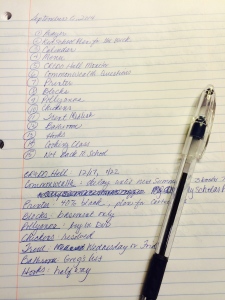 First, we pray. We are Catholic and so we start with the Memorae. Use whatever centering activity you and your spouse mutually like. If one or the other of you is a bit squeamish about praying to start the meeting, use something simple. The idea here is to invite the universal power to join you and inspire your meeting so that you can live authentically.
First, we pray. We are Catholic and so we start with the Memorae. Use whatever centering activity you and your spouse mutually like. If one or the other of you is a bit squeamish about praying to start the meeting, use something simple. The idea here is to invite the universal power to join you and inspire your meeting so that you can live authentically.
Second, we Make The List. I have a list that I keep on a scrap of paper all week. I bring that and as I say the items out loud, I transfer it to the notebook. This nearly always prompts my husband to add things that he thinks of and/or new things that we know that we have to include. (I am sharing mine here – complete with scribbles and bad penmanship.)
Third, we Check The Calendar. By doing this early on in the meeting, we have the chance to discover other things that we might need to consider when working with our plan. We make sure that we have the same family items on our respective calendars and we take time to work out who may be driving, collecting, attending, etc.
Fourth, we Talk It Through. This is my chance to tell the stories connected to our life. When I listed “cooking class” at a recent meeting, it was my opportunity to explain that a friend had asked if I would do a Mom School on cooking for her older girls. We had the chance to talk about what that would look like, what it would mean for our family and how that connected with my vocation and my compass. I was able to have the attention, insight and support of my best friend as he helped me to come to some decisions that would impact our family life and my personal vocation. Sometimes the items we are talking about are as simple as asking him to install a hook or replace the broken doorbell. Sometimes they are much bigger and speak to the heart of one or the other of us. When I approach him with love, respect and friendship, he feels invited to mentor and encourage me. This will always feel like a date to me.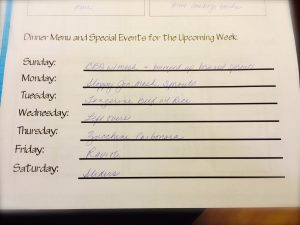
Fifth, we Write A Menu. In one of the Leadership Education audios from the 7 Keys Certification, Rachel talks about how she and Oliver humorously tried to find a way to either eat less or require less cooking of her. Let’s be frank. A home is where we break bread. If there is to be any chance of us having regular and meaningful dinner discussion and peaceful family evenings, there has to be a meal plan. Our kids are too little and too routine dependent for us to just “Top Chef it” (throw together whatever you have without a plan within 30 minutes) all of the time. We map out our food based on what we have, what is on sale and what is seasonal. This is a huge time saver during the week for me.
After FEC each Sunday, we hold parent/child interviews. Each interview covers areas of concern, opportunity, etc. (as just discussed in the FEC) and gets the child’s input. Interviews are used to give assignments, review past work or performance, coach, suggest changes, review how the child is using his structured time, inform him of events in the upcoming week, ask deep questions, resolve problems, and so on. (Leadership Education, Page 75).
Sixth, we Prepare to Mentor. We save this step for last because it usually inspires us to transition right into Family & Mentor Meetings. In Leadership Education, these are called Parent Child Meetings because Mentor Meetings are reserved for Scholar Phase and the routine meeting with formal mentors. Since our kids are 3, 5 & 7. we figure that these will be good practice for mentor meetings down the road. We called them Mentor Meetings once and the name stuck, so we go with it.
To Prepare To Mentor, we take a few minutes to talk about each child. We highlight successes from the week, indicate areas that need attention, suggest goals for the new week and highlight any required homework for church. When we actually conduct the meetings, we have a 4th box in which I note any questions or comments that the child may have that weren’t part of our plan and any books that they would like to see show up in Kidschool. During the week when the kids have questions for me that are logistical, goal oriented, involve Dad or anything like that, I tell them to save those for Mentor Meetings – and they do. “When are we going fishing again?” “Why don’t we have swim lessons anymore?” or “Can you help me make a savings goal for some new Dover coloring books?”.
At first, I just wrote these notes down in my notebook. I began to realize, however, that a clean form that I could tuck into a binder would build into a whole binder of success stories and snippets of our life. Let’s call it an awkward attempt at a Common Place book for our homeschool.
These meetings are not fast. They can be as short as half an hour but usually they are more like 90 minutes. I know that 90 minutes can seem like an eternity to a busy family – especially if one or more of you do not like to have “meetings”. This certainly could go faster if I came more prepared. But, for us, this gives us a relaxed pace to bond as co-team captains and carve out the next week of authentic leadership living for our home.
Whatever you do, don’t forget the cookies. Cookies make everything more fun.

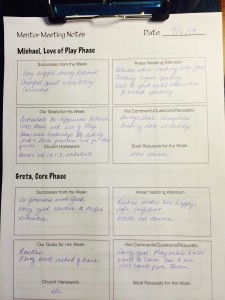
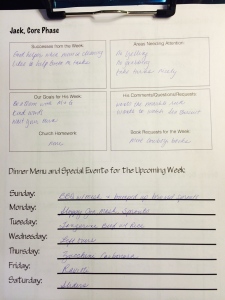

Thank you this was very helpful. It has given me some ideas. I love the date idea… treats etc. A spoon full of sugar